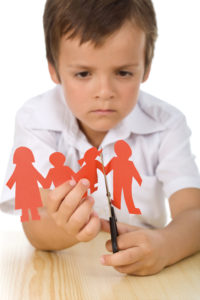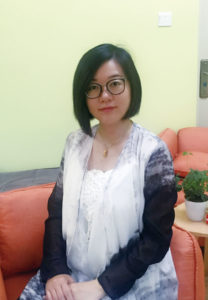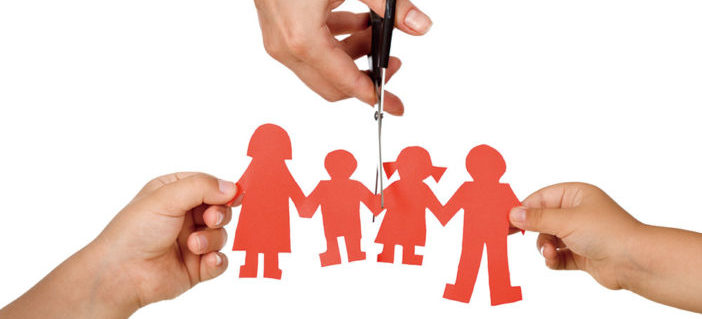When parents separate or divorce, it’s usually a traumatic event which causes a lot of emotional stress and could have an adverse impact on their lives in and outside of school. Whether it is acting out in the classroom, playing the blame game with your parents or siblings, or having to experience your parents badmouth each other, these actions can continue to affect you well beyond childhood and into your adult years. This is why it can be helpful to seek out counseling at school when it is needed, in hopes of minimizing the complications that arise during this difficult time. We talked to Wang Anmin, a full-time psychological counselor at Beijing Royal School, about some of these issues, and ways that teachers and classmates can help students living through a divorce.
How is a student’s emotional well-being affected when parents get divorced?
A student’s emotional health varies from person to person, but all are forced to adapt to the process, which will produce many negative emotions. The most common of these emotions being low self-esteem from the feeling that their family is no longer complete, loneliness as their sense of security is reduced, irritability as hostility begins to grow between the child and people around him or her, anxiety from their concern toward the future, and depression as they refuse to accept the separation of their family.
How are their academics affected?
For students of divorced parents, the degree of impact may also vary. The majority of students of divorced parents will see a decline in academic performance. Their emotions are affected, so that they simply can’t focus in the classroom. They’ll lack spirit in their classroom performance, won’t listen, their homework might be sloppy, or even incomplete or plagiarized, along with a high degree of distraction, and other issues that will inevitably lead to a decline. The students may also choose to use bad behavior to escape from the damage of their parent’s divorce, such as coming home late, truancy, and other misbehavior to gain the attention of parents, while avoiding their own trauma.
What are some ways teachers can support students during a difficult time such as this?
This stage of the student’s life is generally more lonely, and the teacher can make up for this as they are an authority figure. Teachers can give these students more comfort and care, while at the same time paying attention to the dynamics of students in the class, so as to not let them be discriminated against or neglected by their peers. In addition to doubling the care of divorced students, you can also organize a variety of class activities to strengthen the interaction between students, and guide students with divorced parents to participate in collective activities, to get collective warmth, and eliminate their loneliness. These are opportunities for students to develop positive emotions in their collective activities, minimize depression, and eliminate their sense of inferiority, so that students return to normal learning faster.
How can peers, friends, and neighbors support these students?
Peers and friends should give these students more company, and pay attention. Do not say “I can understand how you feel,” as this time he or she is more sensitive, and hearing too much about his parents being divorced will make him or her distressed. Neighbors should also try to pay attention to the dynamics of the family and whether the parents are present or concerned about the psychological state of the child.
How much time will a student need to feel “normal” or “stable” again after parental divorce?
This problem is different from person to person, mainly because of the student’s environment, personality, and family are not the same. All students who face the problem of divorce are forced to gradually adapt. If the parents going through the divorce are very democratic, care for their child’s heart, and respect the child’s choice, while school teachers and friends also remain concerned so that he is not lonely, the student will soon adapt to this change. On the contrary, if there is fighting over custody or other reasons to make the environment at home difficult, the child’s own character may become sensitive or suspicious, requiring a longer time. Under normal circumstances, when the parents are about to divorce, a lot of attention should be placed on the child’s mental health.
 How would a school counselor help in this situation?
How would a school counselor help in this situation?
Children of divorced families are more likely to have psychological problems and behavioral problems than children who grow up in normal families. But for divorced families that have access to good education and effective psychological counseling, the probability of psychological problems will be greatly reduced. The school psychologist for the child of a divorced family can play a very important role. Though parents are the best teacher in this sort of situation, sometimes using the more scientific approach of a therapist can help you avoid bad examples and help return the child back to the right track of healthy development. Many parents are guilty of competing for custody, forcing the child to pick a side by saying “if someone asks if you want to be with me or your father you must say mother.” This form of forcing your child to make a mandatory decision, or not letting one parent see the child is likely to cause some damage. You must remember that it is very important that the child be allowed to love both parents equally, as neither parent’s love for the child has changed, only the relationship between the mother and father. In these situations, the counselor can help explain the situation more, to prevent irrational behavior, physical or emotional self-harm, and accept the situation to move forward.
 Biography Information
Biography Information
Wang Anmin is a full-time psychological counselor at Beijing Royal School, and graduated from Heilongjiang University with a Master’s of Educational Psychology. She has been engaged in student mental health work for more than six years, helping students adapt to school life and avoid psychological problems that can arise during these developmental years. If she hadn’t become a counselor it is very likely that she would have become a teacher, as she came from a family of educators.
Photos: Uni You





